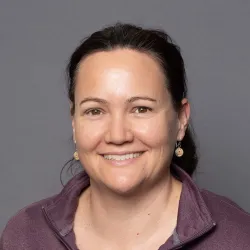Naomi Mitchell

Senior Research Officer – The Quinn Group
Manager – JCSMR Drosophila Facility
Manager – ACT Brain Cancer Biobank
Content navigation
About
After completing a Bachelor of Biomedical Science with Honours at the University of Melbourne (2004), Naomi joined Prof. Leonie Quinn’s group and began research at the Peter MacCallum Cancer Centre (2005-2007). Naomi then made the move with Prof. Quinn when Prof. Quinn established her laboratory at the University of Melbourne in 2007. In 2016 Prof. Quinn relocated to The John Curtin School of Medical Research (ANU, Canberra), Naomi relocated along with Leonie as a senior research officer in the Brain Cancer Discovery Group. Naomi also now serves as manager of the ACT Brain Cancer Biobank, a vital resource for advancing brain cancer research.
Affiliations
Division
Groups
- The Quinn Group - Brain Cancer Discovery, Researcher
Location
Room 3.349
Publications
Recent selected publications:
- O. Zaytseva, N.C. Mitchell, D. Muckle, C. Delandre, Z. Nie, J.K. Werner, J.T. Lis, E. Eyras, R.D. Hannan, D.L. Levens, O.J. Marshall, L.M. Quinn, Psi promotes Drosophila wing growth via direct transcriptional activation of cell cycle targets and repression of growth inhibitors, Development 150 (2023). https://doi.org/10.1242/dev.201563. (5YIF: 7.8)
- Olga Zaytseva, Naomi Mitchell, Linna Guo, et al., Leonie Quinn. Transcriptional repression of Myc underlies AGO1's tumour suppressor function. Development 2020, 147: dev190231 doi: 10.1242/dev.190231. June issue “Research Highlight" and “People Behind the Papers” feature interview (5YIF: 7.8)
- Nick Lim, Naomi Mitchell et al., Leonie Quinn. Glial-specific functions of microcephaly protein WDR62, and interaction with the mitotic kinase AURKA, are essential for Drosophila brain growth. Stem Cell Reports 2017 v9 (1), p32-41 (5YIF 7.7). Feature Article “Medical Express” microcephaly-brain-size-linked-mutation
- Linna Guo, Olga Zaysteva, Naomi Mitchell et al., Leonie Quinn. Defining the essential function of FBP/KSRP proteins: Drosophila Psi interacts with the Mediator Complex to modulate MYC transcription and tissue growth. Nucleic Acids Research 2016 doi.org/10.1093/nar/gkw461 (5YIF 17.16)
- Amanda Lee, Naomi Mitchell et al., Leonie Quinn. Hfp-dependent transcriptional repression of dMYC is fundamental to tissue overgrowth in Drosophila XPB models. Nature Communications 2015 doi:10.1038/ncomms8404 (5YIF 17)
- Naomi Mitchell, et al., Leonie Quinn. Hfp inhibits Drosophila MYC transcription and cell growth in a TFIIH/Hay-dependent manner Development 2010 137 (17): 2875-2884 (5YIF: 7.8)
